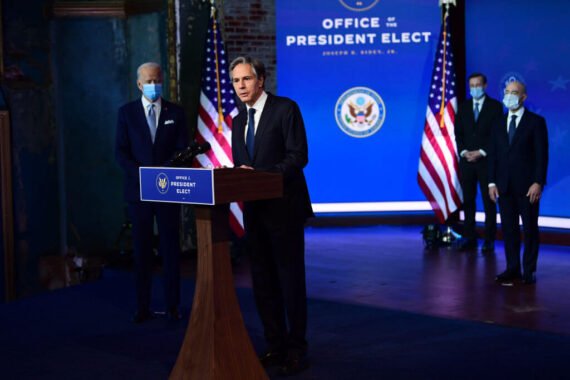
Since Blinken has never held elected office, it is difficult to discern to what extent his public pronouncements on policy issues reflect his personal views and to what extent they serve as faithful barometers of the elected officials he advises. Most likely, they reflect a combination of the two.

Secretary of State nominee Antony Blinken speaks after being introduced by President-elect Joe Biden as he introduces key foreign policy and national security nominees and appointments at the Queen Theatre on November 24, 2020 in Wilmington, Delaware. Photo by Mark Makela, Getty Images
President-Elect Joe Biden has nominated Antony Blinken, a top Democratic foreign policy official and long-time adviser, as his Secretary of State.
Blinken served in senior foreign policy positions with the National Security Council during the Clinton administration and at the State Department during the Obama administration.
In between those assignments, for more than a decade, Blinken served as a key foreign policy adviser to Biden. Blinken served as the Democratic Staff Director of the influential Senate Foreign Relations Committee from 2002 to 2008, when Biden was alternatively chair and ranking member of the committee.
Before being confirmed as Deputy Secretary of State in 2014 during the Obama administration, Blinken served as Vice President Biden’s National Security Adviser.
It is difficult to discern to what extent Blinken’s public pronouncements on policy issues reflect his personal views and to what extent they serve as faithful barometers of the elected officials he advises.
Since Blinken has never held elected office, it is difficult to discern to what extent his public pronouncements on policy issues reflect his personal views and to what extent they serve as faithful barometers of the elected officials he advises. Most likely, they reflect a combination of the two.
Read: Jewish Americans Wanted Anything But Donald Trump
Blinken’s decades of experience in top Democratic foreign policy circles brings with it assets and liabilities. On the plus side, he understands the bureaucratic workings of the State Department and the value of traditional alliances, the lack of which demoralized many career diplomats during the Trump administration.
On the negative side, he also comes to the position saddled with the calamitous foreign policy decisions of the elected officials he advised, most notably Biden’s leading role in providing Democratic support as chair of the Senate Foreign Relations Committee to authorize the Bush administration’s illegal war on Iraq.
Although Biden eventually expressed regret for this mistake, as late as this year, Blinken was still deceptively referring to the authorization for use of force against Iraq as a “vote for tough diplomacy.”
More recently, as a senior foreign policy figure in the Obama administration, Blinken shares in the blame for the president’s incoherent, piecemeal, and unprincipled response to the Arab Spring, which consisted of a combination of questionably unauthorized uses of force against long-time adversaries and a studied indifference to the repression inflicted by brutal allies against their citizens.
If Blinken is confirmed for the position by the Senate–and there is every reason to believe that his centrist foreign policy worldview and his frequently resorted to faith in the use of force will endear him to Senate Republicans, ensuring a quick and smooth confirmation with bipartisan support–what would his stewardship of the State Department mean for US policy toward three key countries in the Middle East?

US Deputy Secretary of State Antony Blinken (R) is informed by an official as he inspects interior parts of the Grand National Assembly of Turkey (TBMM) which were damaged during the July 15 failed military coup attempt in Ankara, Turkey on September 27, 2016. Anadolu Images
Blinken on Syria
The nearly decade-long civil war in Syria has generated the largest displaced persons crisis in the world, with more than 6.6 million refugees and 6.1 million internally displaced people.
The Assad regime’s brutal response to an initially nonviolent uprising ultimately led to an infinitely more complex situation involving armed militias, transnational terrorist organizations, proxy warfare, and regional and international armed interventions.
The Obama administration “pursued a policy of calculated dithering in Syria, just agonizing over the choices until they no longer existed,” according to Emile Hokayem, a senior fellow at the International Institute for Strategic Studies.
This muddled policy, which consisted of laying down “red lines” against the use of chemical weapons that were crossed by Assad without consequence, an ineffectual $1 billion program run by the CIA to arm and train Syrian rebels, and direct armed intervention against the Islamic State and other groups, helped the Assad regime reassert control over much of the country and made a mockery of Obama’s early call for regime change.
Read: Muslim American Votes Were More Anti-Trump than Pro-Biden
In 2017, Blinken praised the Trump administration for bombing Syrian airfields in response to the Assad regime’s use of chemical weapons against civilians and called for “smart diplomacy” to “move toward a negotiated transition of power,” a goal which he admitted “eluded the Obama administration.”
Earlier this year, Blinken expressed greater remorse for the Obama administration’s “failures” in Syria. “The last administration has to acknowledge that we failed, not for want of trying, but we failed. We failed to prevent a horrific loss of life. We failed to prevent massive displacement of people internally in Syria and, of course, externally as refugees. And it’s something that I will take with me for the rest of my days.”



